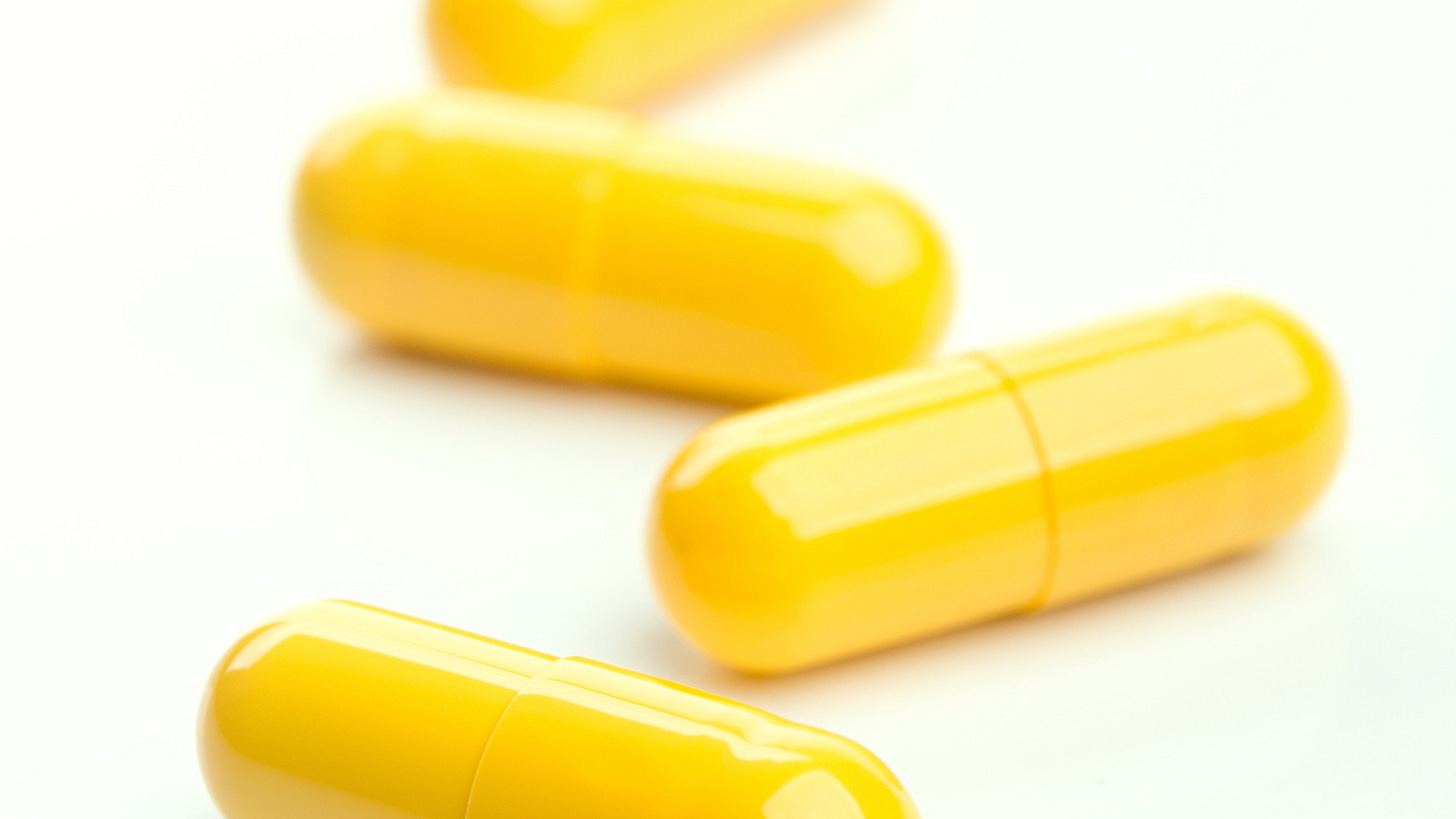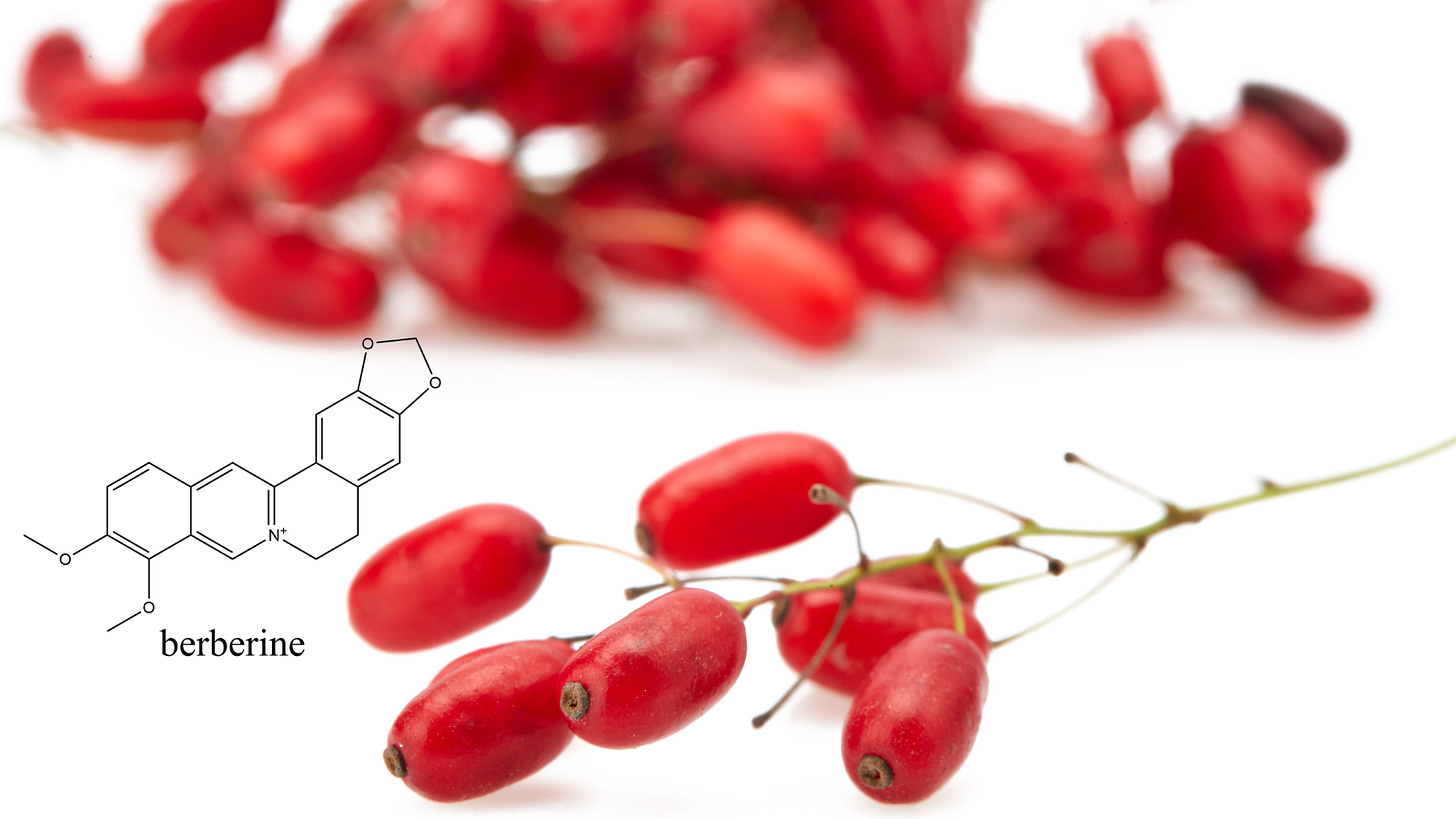No, berberine is not a ‘natural Ozempic.’
I cover fact versus fiction on the debate around berberine for weight loss.
Last week was busy for me as I was hosting a large (300+) conference on ethnobotany and ethnobiology at Emory University. I missed my regular paid Thursday post (apologies!!) and am making up for it with an extra post this week. During the busy week, I learned of the new TikTok buzz on berberine’s use as a weight loss aid.
As with anything that sounds too good to be true, it usually is just that. Throughout my training and career in medicinal plant research, I’ve seen many fads come and go. The most dangerous ones tend to be those ‘natural cures’ that promise fast-acting results for weight loss, athletic performance, or erectile dysfunction. If you missed it, see this earlier post on herbs touted as sexual stimulants.
A History Lesson
When it comes to weight loss, we’ve got a history of terrible choices in ingredients. Does anyone recall Fen-Phen from the 1990s? Here’s a great NY Times article on its rise and fall. Fen-Phen was a ‘miracle’ pill made up of a combination of fenfluramine (an appetite suppressant) and phentermine (a type of amphetamine). It turns out that fenfluramine caused heart defects in nearly one-third of patients and combining this with an amphetamine-like substance (similar to ‘speed’) also led to common cardiovascular side effects of high blood pressure and fast heartbeat. The result: people died. The FDA pulled this from the market.
In addition to the pharmaceutical drug Fen-Phen, there was a natural ingredient player in the weight-loss market during this period: ephedrine. It was also listed as ephedra or ma huang on dietary supplement labels. Ephedrine is a natural compound derived from the medicinal plant Ephedra sinica. Ephedra has been used in Traditional Chinese Medicine for millennia to relieve cold and sinus congestion symptoms. A related compound, pseudoephedrine, is the magic behind Advil Cold and Sinus. This molecule is highly effective in reducing sinus congestion because it constricts blood vessels, including the capillaries in and around your nose, which when dilated are responsible for the stuffiness experienced when suffering from sinus congestion.

If you wish to buy pseudoephedrine in the US today, you must do it at the pharmacy counter and provide your driver’s license. This went into effect to prevent illicit drug manufacturers from buying the product in bulk and using this over-the-counter medication as a starting point for producing “meth” (methamphetamine). Both ephedrine and pseudoephedrine are a type of amphetamine, and the difference in chemical structure between ephedrine, pseudoephedrine, and methamphetamine is quite small.
All ephedra products (including the plant and ephedra alkaloids) are now banned as dietary supplement ingredients today because, as a form of amphetamine, they too cause heart problems and lead to deaths of people regularly taking these ingredients for weight loss or athletic performance.
Once these stimulants were banned, the supplement industry turned to another type of stimulant for weight loss and athletic performance: caffeine and related compounds. While millions of people across the globe safely consume caffeine daily in coffee, tea, and energy beverages, the risk comes when taking caffeine or other related xanthine alkaloids in very high doses. This can lead to rapid heart rate, high blood pressure, skin reactions, and even death in high-risk patients (with pre-existing heart defects) or folks combining high-dose caffeine with intense exercise. Caffeine concentrations of 80–100 mg/L are considered lethal. Even folks in great shape, such as athletes, have succumbed to death by caffeine. Much to my dismay, high-dose caffeine products remain available on the supplement market today, and people can even order caffeine powder in bulk! That is a horrible idea.
The Ozempic Wave
Semaglutide, an injectable pharmaceutical drug, recently emerged for use in treating diabetes and obesity. The drug Semaglutide is marketed under the brand names of Ozempic, Wegovy, and Rybelsus. In 2017, Ozempic (an injectable drug) was FDA-approved to treat Type 2 diabetes; it has not been FDA-approved for weight loss. In 2019, the FDA approved Rybelsus as the first oral GLP-1 treatment for Type 2 diabetes—no injections required! In 2021, the FDA approved Wegovy (an injectable drug) for weight loss.
A medication you can take to lose weight quickly? Many are saying, YES! Sign me up! The problem, of course, is that not everyone fits the inclusion criteria for this prescription. Even if you do, consider the side effects of semaglutide carefully. Many experience gastrointestinal issues such as diarrhea, nausea, vomiting, and abdominal pain.
How does it work?
Semaglutide is not a stimulant or amphetamine-like compound but instead activates GLP-1 receptors and reduces glucose during fasting or after a meal. While I’d love to kick off the last of my baby weight—my last child was born ten years ago, and I can’t clear those extra 15 pounds that stuck around—the idea of living in a state of nausea and with little to no appetite for food or alcohol is a hard NO for me.
Rapid weight loss associated with the drug has also led to facial ‘aging’ (some in the public call this ‘Ozempic face’), in which sagging skin from the overall weight loss can affect facial appearance. I’ve heard from colleagues in the dermatology community that there has been an uptick in the number of patients seeking cosmetic filler procedures for their face following weight loss with semaglutide.
What’s Happening with Berberine?
When I first heard about the buzz on berberine for weight loss, I had two immediate reactions:
Berberine is an antimicrobial agent, not a weight loss drug in traditional medicine; and
Why is the pure compound available as a supplement ingredient in the first place?
Let’s start with the basics. Berberine is a natural chemical compound found in a number of medicinal plants, including barberry, goldenseal, prickly poppy, and tree turmeric, among others. Since 1927, berberine has been examined in 7,704 scientific studies for various applications. It is important to note that berberine is broken down via various pathways once ingested, yielding a wide variety of metabolites (side-products). One possible reason berberine acts on different targets could be its degradation products working on different targets in the body. Plus, berberine itself is poorly absorbed across the gut barrier and has poor bioavailability, meaning that only low levels of the berberine chemical compound reach blood circulation.
The antimicrobial properties of berberine are well-documented. In traditional Chinese Medicine, plants rich in berberine are taken to treat bacterial diarrhea; these plants have also been found to lower glucose levels. One working hypothesis is that modulation of the gut microbes by the antimicrobial agent berberine could alter the composition of bacteria in the gut and lead to these observed effects.
A 2020 paper published in the high-tier scientific journal Nature Communications reported the findings of the PREMOTE study, which evaluated the gut-microbiome-related effects of berberine and probiotics on Type 2 diabetes. The study was designed as a randomized, double-blind, placebo-controlled trial on 409 newly diagnosed Type 2 diabetic patients from 20 hospital centers in China. Patients were treated for 12 weeks with berberine alone, probiotics plus berberine, probiotics alone, or placebo (no berberine or probiotics in the pill). While the berberine treatments caused more gastrointestinal side effects, it also yielded a hypoglycemic effect tied to the inhibition of a specific gut microbe: Ruminococcus bromii, which may be responsible for the underlying antidiabetic effect of berberine.
Importantly, berberine is not a stimulant like caffeine or an amphetamine like ephedra (ephedrine or pseudoephedrine), nor is it a GLP-1 receptor activator like semaglutide. Thus far, we know that berberine has antimicrobial activities on microbes found in the gut and can change the composition of bacteria found in the gut.
Is berberine safe? We don’t know, and some known risks for herb-drug interactions exist. Just as I wouldn’t support using an antibiotic like penicillin for weight loss due to the risk of propagating antibiotic-resistant bacteria with long-term drug use, the same applies to any antimicrobial compound, including berberine! Any chemical compound antibiotic, whether derived from a fungus (like in the case of penicillin) or a plant (as in the case of berberine), if used in regular low doses, will lead to the emergence of antibiotic-resistant bacteria to that drug. We don’t know what the consequences of breeding berberine-resistant gut microbes will be, and that is not something I think we should be doing in humans by making this powerful antibiotic drug available as a supplement ingredient.
A review of the toxicology of berberine also raises questions about cardiovascular concerns. A study in dogs in which berberine was administered by IV showed cardiac depression effects. In humans, clinical studies on Type 2 diabetic patients primarily noted gastrointestinal side effects (diarrhea, constipation, flatulence), likely due to the antimicrobial effects on gut microbes and poor absorption into the bloodstream. One thing to note for anyone taking pharmaceutical drugs is that there is a potential for an herb-drug interaction, as berberine can interfere with how other drugs are metabolized. For example, kidney transplant patients taking cyclosporine with berberine had much higher cyclosporine levels in their blood.
Is berberine effective for treating obesity? We don’t know. A 2020 systematic review of studies in mice and humans addressed this question. While some of the evidence supports the utility of berberine in decreasing lipid levels in rats, modulating the human gut microbiome, and reducing glucose accumulation, we still need rigorously controlled trials to get a firm answer.
The Takeaway
We don’t have enough evidence to determine if berberine is safe or effective for supporting weight loss. We do know that taking berberine can be dangerous if you take other pharmaceutical medications, as it is known to interfere with how your body breaks down some medications. Furthermore, just as you shouldn’t regularly take an antibiotic without a doctor’s supervision, I urge you to treat this plant-derived antibiotic in the same way. While plants rich in berberine have been used in traditional medicine for millennia as a therapy for diarrhea, this application has always been for short periods to treat a disease, never for long-term use and with the goal of weight loss.
If you have been diagnosed with Type 2 diabetes or are facing a chronic illness associated with obesity, talk to your doctor about the best treatment plan—whether it involves medication and/or dietary modification—to fit your specific needs.
Yours in health, Dr. Quave
Cassandra L. Quave, Ph.D. is a scientist, author, speaker, podcast host, wife, mother, explorer, and professor at Emory University School of Medicine. She teaches college courses and leads a group of research scientists studying medicinal plants to find new life-saving drugs from nature. She hosts the Foodie Pharmacology podcast and writes the Nature’s Pharmacy newsletter to share the science behind natural medicines. To support her effort, consider a paid or founding subscription, with founding members receiving an autographed 1st edition hardcover copy of her book, The Plant Hunter.








This is a great review, including the preamble with other meds used to ”help” with weight loss. In terms of talking with your doctor about berberine, I think you’ve presented more than most of us know about it! The many unknowns are typical of the natural supplement industry, with “natural” as an adjective encompassing both fluffy bunnies and venomous snakes.
Gut modulation is anything but simple, and doing this through antibiotic means instead of prebiotic ones sounds like a red flag to me, too.
I’ll skip recommending berberine based on this post. Buyer and microbiome beware.
1. Semaglutide is one of the strangest looking molecules I have seen.
2. I take several plant supplements to reduce inflammation, like fisetin and quercetin. I feel somewhat different about taking alkaloids, though, because of their greater reactivity and potential toxicity. The multiple pathways for Berberine metabolism is also a bit odd.
3. These are very interesting discussions.